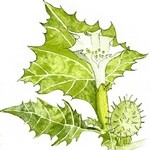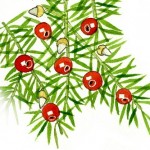by Catherine Haug
In a recent newsletter from the Three Rivers Land Conservancy’s Backyard Habitat Certification Program (Portland, OR), I found a link to an article titled “Poison plants: Many look edible.” As times continue to get tough, foraging for food may become a necessity; knowledge of poisonous plants can be life-saving.
Of course, this list is for western Oregon, but many of these also grow here, and also can be bought at local nurseries. Please note this list is NOT all inclusive! Here’s the list:
POKEWEED (Phytolacca americana) [is grown] for its spectacular fall colors, but the entire plant, which also produces attractive berries, is poisonous.
CASTOR BEAN (Ricinus communis): A beautiful 10-foot shrub grown as an annual, its colorful seeds contain deadly ricin. Just three or four seeds are enough to kill an adult. If you grow it, keep the flowers clipped off. Better yet, don’t grow it. Only the seeds are poisonous. Among the symptoms are diarrhea, vomiting, nausea and cramps. (Drawing by Vern Nelson)
DEADLY NIGHTSHADE (Atropa bella-donna): An herbaceous perennial growing to 4 feet tall that produces shiny black berries about the size of small cherries. When fully ripe in September, these berries are very sweet and so are very attractive to children. Among the symptoms are confusion, hallucinations, rapid heartbeat and seizures. (Illustration from Wikipedia – credits Köhler’s Medicinal Plants 1887)
JIMSONWEED (Datura stramonium): Aka loco weed, devil’s trumpet and thornapple, it is strangely beautiful, with long, trumpet-shaped flowers of ivory, white or pale violet. An annual herb that may reach 7 feet tall, all parts of jimsonweed are poisonous, especially the seeds, which are released from the walnut-size capsule in fall. Symptoms are similar to those of deadly nightshade. (Drawing by Vern Nelson)
ENGLISH YEW (Taxus baccata): Evergreen shrubs or trees with small, red, berrylike fruits (arils) that have a lightly sweet taste but a very poisonous seed. Do not eat any part of this toxic plant. Even a small number of seeds or a few leaves can cause gastric distress, and in some people can cause irregular heartbeat, very slow heartbeat and heart failure. (Drawing by Vern Nelson)
Note: All of these plants can be found for sale to gardeners. If you have children, make sure they know that eating plants from the landscape is not OK unless you are there to supervise.

